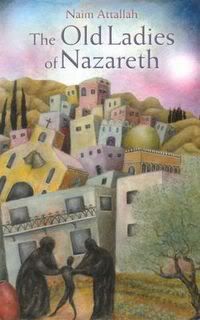The Old Ladies of Nazareth by Naim Attallah

by Susan Abraham
Millionaire author and publisher, Naim Attallah known for eccentric surprises like mismatched socks..in bright blues and reds) scripted this tender 71-page fable called The Old Ladies of Nazareth. (Quartet Books UK, £10).
It is a poetic tale of hardship and fortitude, pain and self-discovery. The thoughtful tale awakens the senses to new joys of family and self, and blessings almost forgotten.
It mixes Aesop with a Rosamunde Pilcher, or features the simplicity of a manger play, measured against the brutality of Brutus.
Yet nothing is too harsh. There is no obvious violence with the exception of haphazard mutilations of the heart, ringed in a sad web. One has to study the picture to pick up sadness when what is so obvious is the pity.
Two old ladies live in the biblical town of Nazareth. They are sisters, one briefly married and widowed who is called Wardeh and the other, a hunched and sickly spinster, called Jamileh. Wardeh is the more prayerful and the kinder.
Yet, when her husband dies and she is heavy with child, she will hand her son over to a German orphanage - where she visits frequently - rather than hand him to the pestering in-laws. The result is an uncaring, cold and grateful son, unsure of his identity and cold with his passions. It is his son, Atallah, to whom the old ladies will love passionately, from his baby years to boyhood, as they have never loved anyone before.
Throughout the book they live a spartan lifestyle, turning to nature to redeem their daily science of living: For example,
"...every morning while it was still dark, Jamileh would go by the light of the stars to collect the eggs laid by the hens, and place them still warm in the basket, so she could sell them at the marketplace at sunrise. There was jubilation if the eggs were plentiful but deep despondency if the hens had not been laying. Jamileh's mood then changed as she berated the birds for failing in their duty and letting her down...
"...at the far end of a garden, was the lavatory. It was primitive even by oriental standards. To use it, you had to crouch to relieve yourself, and you needed to bring a bucket of water with you, to flush it clean.
"It was not an enviable experience to have to answer a call of nature in the middle of the night, especially during the rainy season. The old ladies did not even possess an umbrella to hold over their heads. They could only struggle through the dark, water container in hand, braving the wind and getting soaked to the skin.
"Returning to the house, they had to struggle to change out of their saturated clothes in the dark, before they were able to settle down again to sleep...
"...They could never divert their minds by readng a book or acquiring the extra knowledge that might have eased their relentless routine. Instead, it was through nature that they sought the answer to every problem.
"They invoked nature to heal their wounds, to treat a passing illness or a heightened fever. They turned to nature to tell them the time of day by the position of the sun in the sky. They could even judge the hour of the night by the changing pattern of the stars and planets. With nightfall, their two rooms fell into complete darkness; they were dimlit lit by an oil lamp only at times of sheer necessity..."
Attallah says he wrote this Once-Upon-A-Time book unexpectedly on a hot and humid day in London when from his apartment balcony overlooking a delightful garden scene, he remembered a balcony in his childhood in another city many years ago.
He pleads it as his personal and tender account of a boyhood where life's toughest lessons are learned from this ageing grandmother and aunt who lived together, like two quiet and contented spinsters and who taught him the abstract unforgettable qualities of life.
A decorative pocket book love story and perfect as a mother's day gift.
Labels: Naim Attallah, The Old Ladies of Nazareth


<< Home